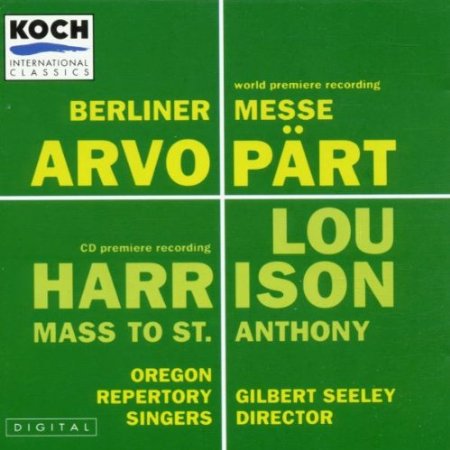Pärt/Harrison Choral Works
View record and artist detailsRecord and Artist Details
Composer or Director: Lou Harrison, Arvo Pärt
Genre:
Vocal
Label: Classics
Magazine Review Date: 4/1994
Media Format: CD or Download
Media Runtime: 50
Mastering:
DDD
Catalogue Number: 37177-2

Tracks:
| Composition | Artist Credit |
|---|---|
| Mass to St Anthony |
Lou Harrison, Composer
Gilbert Seeley, Conductor Laura Crockett, Mezzo soprano LeaAnne DenBeste, Soprano Lou Harrison, Composer Oregon Repertory Singers |
| Berliner Messe |
Arvo Pärt, Composer
Arvo Pärt, Composer David Vanderwal, Tenor Gilbert Seeley, Conductor Karl Blume, Bass Laura Crockett, Mezzo soprano LeaAnne DenBeste, Soprano Marianne Lewis, Organ Oregon Repertory Singers |
Author:
Faith, without Angst, calmly reflected and tellingly expressed through two highly accessible compositional styles. Lou Harrison's work is peaceable and inviting, a deeply sympathetic voice from darker times: completed in the mid 1950s, the Mass (to St Anthony) was initially prompted by Hitler's invasion of Poland. Like Part, Harrison takes his lead from early church music, although his original ground-plan (double chorus and percussion orchestra) was rather more assertive than the end result (chorus, trumpet, harp and strings). Scoring for a lone trumpet rather than for a military snare-drum (Harrison's initial idea) has underlined the spirit of remembrance: the trumpet is actually one of the last instruments to sound at the close of the Agnus Dei. There is desolation as well as comfort, especially in the Sanctus (say, from 4'24'' to 6'00''), the Mass's longest single movement. The Gloria makes particularly harmonious use of the trumpet, the brighter Credo follows a quietly ecstatic course, and the Agnus Dei has a profound simplicity reminiscent of Copland. It is a fine piece and adds an extra dimension to our understanding of a composer who is still too little known within these shores.
The performance, indeed the arrangement, of Arvo Part's Berliner Messe is quite different from the Kaljuste reading that I reviewed so favourably last November. Aside from contrasts in tempo, dynamics and vocal inflexion, there is the significant dissimilarity of having an organ rather than strings accompany the chorus. Sometimes this option works well (at the beginning of the Kyrie, for example), yet Veni Sancte Spiritus loses in atmosphere and the wonderful Agnus Dei seems a mere reflection of its true self without those ethereal veils of string tone. Seeley uses a more modest chorus (24 singers in all), and has the openings of the Veni Sancte Spiritus and Agnus Dei sung by soloists, whereas Kaljuste's forces sound rather more generous, an option that ECM's engineers exploit to superb effect. Koch International grant Seeley a close, pleasingly intimate recording and although I continue to prefer Kaljuste's more wholly ethereal realization of this wonderful score, Seeley's Berliner Messe has an affecting directness, and also helps place Harrison's work in a useful musical context.'
The performance, indeed the arrangement, of Arvo Part's Berliner Messe is quite different from the Kaljuste reading that I reviewed so favourably last November. Aside from contrasts in tempo, dynamics and vocal inflexion, there is the significant dissimilarity of having an organ rather than strings accompany the chorus. Sometimes this option works well (at the beginning of the Kyrie, for example), yet Veni Sancte Spiritus loses in atmosphere and the wonderful Agnus Dei seems a mere reflection of its true self without those ethereal veils of string tone. Seeley uses a more modest chorus (24 singers in all), and has the openings of the Veni Sancte Spiritus and Agnus Dei sung by soloists, whereas Kaljuste's forces sound rather more generous, an option that ECM's engineers exploit to superb effect. Koch International grant Seeley a close, pleasingly intimate recording and although I continue to prefer Kaljuste's more wholly ethereal realization of this wonderful score, Seeley's Berliner Messe has an affecting directness, and also helps place Harrison's work in a useful musical context.'
Discover the world's largest classical music catalogue with Presto Music.

Gramophone Digital Club
- Digital Edition
- Digital Archive
- Reviews Database
- Full website access
From £8.75 / month
Subscribe
Gramophone Full Club
- Print Edition
- Digital Edition
- Digital Archive
- Reviews Database
- Full website access
From £11.00 / month
Subscribe
If you are a library, university or other organisation that would be interested in an institutional subscription to Gramophone please click here for further information.




